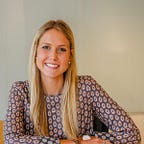Geopipe Creates Immersive Virtual Copies
Of the Real World
RDV is excited to back Geopipe, a NYU and Brown University-born startup building clever algorithms that turn 2D and 3D data into highly detailed 3D virtual models
Architects and urban designers, play a significant role in building cities that are functional, beautifully designed, and provide a form of creative expression for our society. This requires careful and detailed planning and modeling of the physical environment in order to ensure proper building usage, safety, and overall look and feel. Yet today, the bulk of this process, which includes collecting data and researching details about the environment, is performed entirely by hand. For just a few square city blocks, this can take from anywhere between eight hours and three weeks. This problem isn’t unique to architects either — special effects artists and video game designers endure the same tediousness when designing films or games. The 3D mapping modeling market is sized at $4.56B and on track to grow to $16B by 2020. Virtual models alone represent $400 million spend across architecture, urban design, military, first responder training, and special effects.
Christopher Mitchell (Ph.D. graduate 2015 and current Adjunct Professor of Computer Science at NYU) and Thomas Dickerson (Ph.D. in Computer Science, Brown, 2018) both discovered this challenge when applied to games: Christopher was trying to automatically build New York City in Minecraft at a 1:1 scale, and Thomas was creating landmark buildings out of virtual LEGO bricks. The two bonded over their their joint passion for applying algorithmic techniques to process and understand data about the real world, as well as about the many fascinating applications that become possible when you can explore, render, and even modify detailed models of the world.
Realizing that there was no place to get the detailed, semantically rich models they needed for these game applications, Christopher and Thomas built Geopipe, a tool that automatically reconstructs detailed models of entire cities in a few hours on a cluster of servers. Geopipe’s algorithms automatically generate immersive models of the world from existing sensor data. By ingesting and understanding 2D and 3D data like satellite photos, maps, laser scans, terrain contours, and more, their platform uses machine learning to analyze the data and reconstruct models at configurable levels of detail, meeting the needs of a wide variety of customers.
Before Geopipe, Christopher spent time with the R&D team at Bloomberg, VMware’s Nicira division, and IBM Watson. As an undergrad at Cooper Union, he got his first taste of academic research in summer REU programs at Stevens Institute of Technology and SUNY Binghamton. With Thomas, he also founded Cemetech, a volunteer group that has taught programming to thousands of students and teachers. At Cemetech, his SparseWorld project, an academic distributed computing project to automatically build full-scale interactive models of huge real-world areas such as cities, inspired his work with Geopipe.
Thomas has extensive research experience in interdisciplinary simulation and modeling as well as high-performance computing, having worked as a research assistant at Middlebury College, Saint Michael’s College, and Brown University. Notably, he received a National Undergraduate Fellowship from the US Department of Energy’s Princeton Plasma Physics Laboratory. He has completed graduate level coursework in algorithms, concurrent & distributed computing, machine learning, and computer vision as part of his doctoral studies at Brown University. A course project on automatically generating iconic representations of building facades was a direct inspiration for current R&D at Geopipe.
In June 2016, the two joined NYU’s Summer Launchpad program at NYU’s Leslie eLab, where they worked on Geopipe’s initial business model and conducted about 115 customer interviews. Frank Rimalovski, Executive Director, NYU Entrepreneurial Institute NYU and Lindsey Gray, Senior Director of the Institute, helped them develop their business model and customer discovery acumen. During the winter of 2017, the two joined in the Combine accelerator run by the NYC Media Lab, where they conducted an additional 120 additional customer discovery interviews, this time focusing more on testing the MVP and building prospective customer relationships. Here, the team worked closely with Justin Hendrix, Executive Director and Satish Rao, Senior Advisor to the lab, focusing on completing their MVP and testing it with prospective customers. Thomas and Christopher are currently leading Geopipe through the Techstars NYC Summer 2017 program.
Thomas and Christopher are focused on meeting the needs of creative professionals who need virtual models of the real world, across special effects, military and other training simulations, video games, and beyond. From there, they’re excited to expand into the quickly growing market of 3D mapping and modeling.
We’re excited to continue supporting the Geopipe team as they create virtual copies of the real world, built by algorithms. Stay tuned for details at @GeopipeInc!
